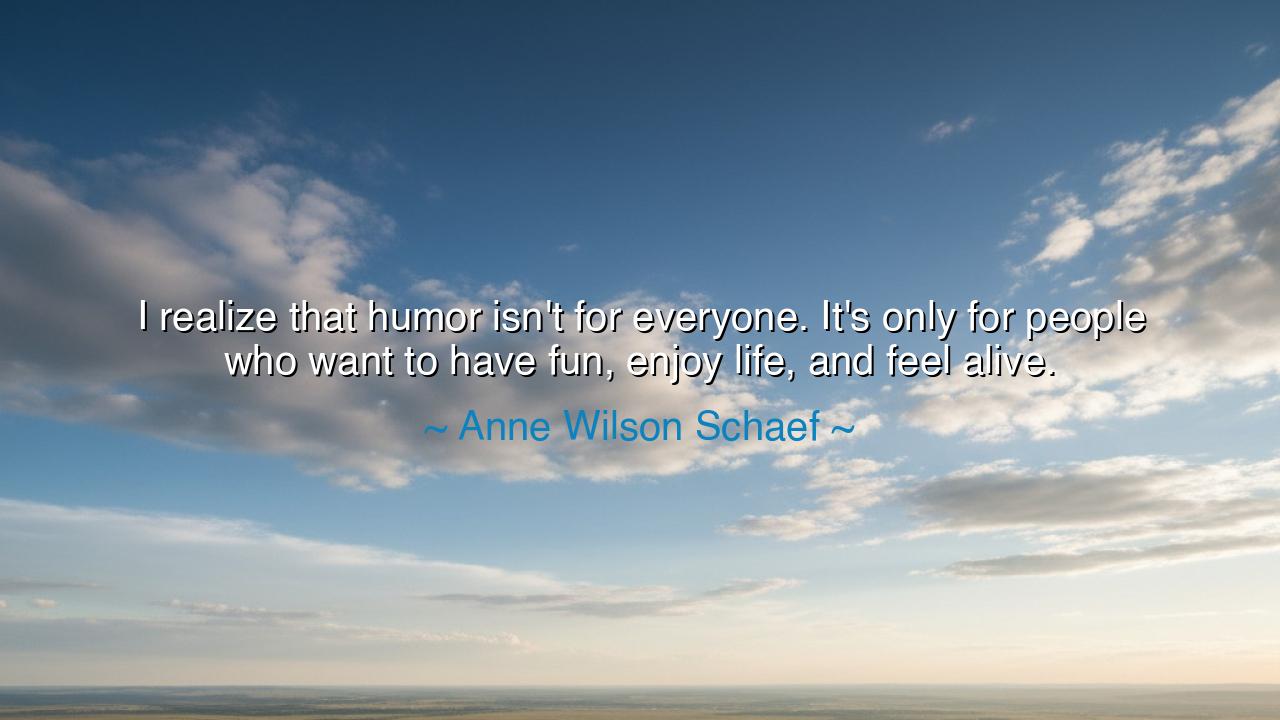
I realize that humor isn't for everyone. It's only for people who
I realize that humor isn't for everyone. It's only for people who want to have fun, enjoy life, and feel alive.






In the tender wisdom of the ages, where joy and sorrow intertwine like roots of the same ancient tree, Anne Wilson Schaef spoke words that shimmer with quiet defiance and deep truth: “I realize that humor isn’t for everyone. It’s only for people who want to have fun, enjoy life, and feel alive.” Within this seemingly simple saying lies a powerful teaching about the human spirit — that laughter is not merely an amusement, but an act of courage. For to enjoy life fully, even amid its storms, is not the mark of ignorance, but of wisdom that has learned to dance with the rain.
Schaef, a psychologist and spiritual teacher, wrote in a time when the modern soul had become weary from striving — when people measured their worth in achievements rather than aliveness. Through her work, she sought to awaken hearts dulled by routine and fear. In this quote, she reminds us that humor is not for those who cling to control or who live in the narrowness of pride, but for those who dare to be free. To laugh is to surrender, if only for a moment, to the miracle of being alive. It is to admit that the world is strange, beautiful, and fleeting — and that in its mystery, there is joy.
A person without humor, Schaef implies, is one who has forgotten how to breathe deeply, how to look upon life with wonder. Humor is the lifeblood of the soul; it loosens the grip of fear and softens the edge of sorrow. Those who can laugh are those who can love — for laughter, like love, requires openness. It is a form of faith, a declaration that no matter how heavy the world becomes, the human heart will not collapse beneath its weight. To laugh is to say, “I am still here,” and in that moment, to reclaim your vitality from despair.
Consider the story of Winston Churchill, a man who stood against the darkest tides of history. Amid war, destruction, and doubt, Churchill wielded humor as both weapon and shield. When told that Britain was doomed, he replied with dry wit, “If you’re going through hell — keep going.” That small spark of laughter kept alive the flame of courage in a weary nation. It was not jest for the sake of folly, but humor for the sake of survival. His laughter, like Schaef’s wisdom, was a declaration of life against the encroaching shadow.
Humor and aliveness, then, are inseparable. The person who laughs truly lives, for laughter is the pulse of joy, the rhythm of being present in the now. In contrast, those who reject humor close themselves to this sacred vitality. They move through life as though already entombed — serious, heavy, and unyielding. Yet life itself is playful; it hides its lessons behind irony, paradox, and chance. Only those who can laugh are awake enough to see its beauty. As Schaef knew, humor is not an escape from reality — it is intimacy with it.
The ancients understood this secret well. The philosophers of old often taught through irony and jest. Socrates, in his calm and teasing manner, questioned men until they laughed — and in that laughter, truth was revealed. For humor disarms the ego, opens the mind, and allows wisdom to enter. It is not mockery but illumination. To laugh is to humble oneself before the mystery of existence and to rejoice that one has been given the gift of participating in it.
So, dear seeker, take this teaching into your heart: choose humor as a way of life. Seek not only to work, to strive, to survive — but to enjoy life and to feel alive. Laugh easily, especially when life feels heavy. Smile even at your own missteps, for in doing so, you reclaim your humanity. Be among those who, as Schaef said, want to have fun not because life is simple, but because they are wise enough to see that joy is sacred. For laughter is not the absence of struggle — it is the presence of soul. And in that laughter, you will find your freedom.






AAdministratorAdministrator
Welcome, honored guests. Please leave a comment, we will respond soon